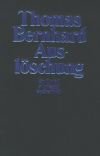
Instead of the book he's meant to write, Rudolph, a Viennese musicologist, produces this tale of procrastination, failure, and despair, a dark and grotesquely funny story of small woes writ large and profound horrors detailed and rehearsed to the point of distraction."Certain books—few—assert literary importance …

Gargoyles is one of Thomas Bernhard’s earliest novels, which made the author known both nationally and internationally. Originally published in German in 1967, it’s a kaleidoscopic work, considered by critics his most disquieting and nihilistic.

Correction is a novel by Thomas Bernhard, originally published in German in 1975, and first published in English translation in 1979 by Alfred A. Knopf. Correction’s set is a garret in the middle of an Austrian forest, described by the narrator as the "thought dungeon" in which the main character, Roithamer, will …

Extinction is the last of Thomas Bernhard’s novels. It was originally published in German in 1986.

It is 1967. In separate wings of a Viennese hospital, two men lie bedridden. The narrator, named Thomas Bernhard, is stricken with a lung ailment; his friend Paul, nephew of the celebrated philosopher Ludwig Wittgenstein, is suffering from one of his periodic bouts of madness. As their once-casual friendship quickens, …

Woodcutters is a novel by Thomas Bernhard, also published in 1985 in another English translation under the title Cutting Timber: An Irritation, and originally published in German in 1984. Second in a trilogy covering the Arts, this one relates to the theatre and created quite an uproar in Austria, where it was banned …

Old Masters is a novel by the Austrian writer Thomas Bernhard, first published in 1985. It tells of the life and opinions of Reger, a 'musical philosopher', through the voice of his acquaintance Atzbacher, a 'private academic'.

Thomas Bernhard was one of the most original writers of the twentieth century. His formal innovation ranks with Beckett and Kafka, his outrageously cantankerous voice recalls Dostoevsky, but his gift for lacerating, lyrical, provocative prose is incomparably his own.One of Bernhard's most acclaimed novels, The Loser …

 English
English Español
Español Deutsch
Deutsch